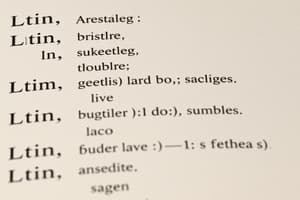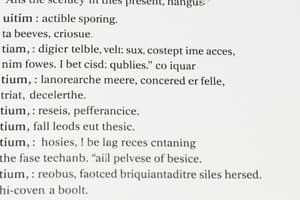Podcast
Questions and Answers
Which of the following verbs is in the passive voice, present tense, 1st person singular?
Which of the following verbs is in the passive voice, present tense, 1st person singular?
The verb "nārrātur" is in the passive voice, imperfect tense.
The verb "nārrātur" is in the passive voice, imperfect tense.
False (B)
What is the English translation of the verb "comprehenduntur"?
What is the English translation of the verb "comprehenduntur"?
They are seized
The verb "______" means "we are feared" in Latin.
The verb "______" means "we are feared" in Latin.
Signup and view all the answers
Match the following Latin verbs with their English translations:
Match the following Latin verbs with their English translations:
Signup and view all the answers
Which of the following verbs has the same stem as "appellor"?
Which of the following verbs has the same stem as "appellor"?
Signup and view all the answers
The verb "nārrāminī" is in the passive voice, present tense, 2nd person plural.
The verb "nārrāminī" is in the passive voice, present tense, 2nd person plural.
Signup and view all the answers
What is the Latin word for "to be enclosed"?
What is the Latin word for "to be enclosed"?
Signup and view all the answers
The verb "______" means "he/she/it is killed" in Latin.
The verb "______" means "he/she/it is killed" in Latin.
Signup and view all the answers
Match the following Latin endings with their grammatical function:
Match the following Latin endings with their grammatical function:
Signup and view all the answers
Flashcards
dormīminī
dormīminī
you (pl.) are slept
inclūderis
inclūderis
you are enclosed
appellantur
appellantur
they are called
comprehendor
comprehendor
Signup and view all the flashcards
necātur
necātur
Signup and view all the flashcards
timemur
timemur
Signup and view all the flashcards
turbātur
turbātur
Signup and view all the flashcards
dormiuntur
dormiuntur
Signup and view all the flashcards
coniicitur
coniicitur
Signup and view all the flashcards
appellāris
appellāris
Signup and view all the flashcards
Study Notes
Latin Verb Conjugations
- Active Voice: Present Tense, Imperfect and Perfect
- Passive Voice: Present Tense, Imperfect and Perfect
Verb Stems and Endings
- Various verb stems are shown, conjugated for different persons and numbers
- Consistent patterns of endings for different active and passive voices are evident.
Verbs and Their Meanings
- Many common Latin verbs, their meanings, and active and passive conjugations are shown
- The verbs include "to call," "to be enclosed," "to be seized," "to sleep," "to be thrown," "to be told," "to kill," "to be disturbed," and "to fear"
- Each verb has various conjugations for different subjects (singular and plural, first, second, and third persons).
Active Voice Examples (Present Tense)
- Dormīminī: You (plural) are sleeping
- Coniiciminī: You (plural) are throwing
Passive Voice Examples (Present Tense)
- Inclūderis: You (singular) are enclosed
- Appellāminī: You (plural) are called
Imperfect and Perfect Tenses (Examples)
- Show different time frames of actions, either active or passive
- Conjugations indicate these verb tenses in the active or passive forms.
Infinitives
- Nārrārī: To be told
- Coniicī: To be thrown
Studying That Suits You
Use AI to generate personalized quizzes and flashcards to suit your learning preferences.
Description
Test your knowledge of Latin verb conjugations, focusing on both active and passive voices. This quiz covers present, imperfect, and perfect tenses, helping you understand various common verbs and their meanings. Challenge yourself with examples and conjugations for different persons and numbers.






